TV
American Horror Story: Delicate
As most of us are already aware, the 12th Season of AHS has been fraught with all kinds of differences to the previous seasons, mainly in that this is the first one to be based entirely off a novel, ‘Delicate Condition’ by Danielle Valentine. The first half of the season aired in October 2023 to mediocre reviews, while the SAG-AFTRA strike caused production and airing delays for the latter half of the season, and the episodes of Part 2 were all cut to less than an hour long apiece. And none of that is even getting into the disjointed attempt at storytelling for Season 12, so let’s dive into this!
Meet Anna Victoria Alcott (Emma Roberts), former young ling star of Hollywood now struggling to recapture fame as an adult, who wants a baby, very very badly. Bad enough to drive herself and her husband Dex (Matt Czuchry) through multiple unsuccessful rounds of IVF (in-vitro fertilization), bad enough to keep trying no matter how crushing each failure turns out to be, bad enough to involve her purported best friend and bougie publicist Siobhan Corbyn (Kim Kardashian) in her struggles, and maybe, just maybe, bad enough to give up on a burgeoning resurgence of her career after interest in her comeback role for The Auteur begins garnering her Oscar-worthy attention.
So, Anna and Dex are going to go through yet another round of IVF, likely one of their last attempts at it, from a different doctor, Dr. Andrew Hill (Denis O’Hare), and clinic based on Siobhan’s recommendation. And already, strange things are beginning to happen to Anna – her appointments that she set herself begin springing up incorrectly, a doom saying woman called Preacher (Julia White) shows up spouting warnings about trusting no one, dire warnings appear in unlikely places, and BTW, it seems as though long-suffering but good-nurtured Dex has a side-piece too. It doesn’t help that Dex’s new partner at his art gallery, Sonia Shawcross (Annabelle Dexter-Jones), bears a striking resemblance to his dead ex-wife Adeline, either. Those spiked emerald heels start appearing weirdly too, and it seems as though no one will listen to Anna as she grows more and more suspicious that some sort of sinister cult has designs on her as-yet-unborn baby. At the same time, Anna tries to live the life of a successful returning actress, attending parties and gallery openings while draping her rapidly-expanding middle in shimmering fabrics and actively ‘campaigning’ for that little golden statue that most actors covet. Competition is fierce, even among her co-stars of The Auteur, and while Anna wants to be supportive of her fellow entertainers, she clearly appears to be incapable of doing both at the same time – wanting the baby and the little gold award at the same time is too much to ask, apparently.
Elsewhere, mostly in the past, various women in states of desperation formed from one situation or another are visited by sinister-looking women in prim black dresses, headgear reminiscent of – to me anyway – an odd cross betwixt birds and bunnies, my guess is an ostensive nod to fertility in general, and a general feeling of blood-bound witchery about them at critical moments of crossroad choices.
Though the second half of the season moves a good deal faster than the first, the attempts at callbacks and reminder flashes to Part 1 hit with all the impact of a dropped bag of garbage onto their friends Talia’s (Julia Canfield) borrowed bougie kitchen floor – splat, into incomprehensible silence, from all parties, both characters and audience, concerned. Even the reminders that, in Part 1 of Delicate Dex’s mother Virginia Harding (Debra Monk) did indeed have perfectly valid memories of abuse at the hands of a black cult and Dex’s own father Dex Sr. (Reed Birney), the revelation pales and peels away in the face of Dex’s true parentage.
Which brings us back around full circle kinda sorta, to the only real character worth a damn in this entire miserable season of strange feminism and aspirations of world domination through a kind of idiotic Rosemary’s Baby nightmare scenario, we should have known she’d steal the show when Kardashian was cast for it, Siobhan Corbyn, leader of the blood cult her high and mighty (old) self. Throughout the whole show her character has remained exactly the same, and it’s a wonder Anna can stare at her all stupefied while Siobhan does her villain speech at the end of the last episode. Siobhan never masked her ambition or greed, her mysterious protective vibe and even deep love for Anna, and can always be counted on to have secret plans of her own, already in motion, bitch.
The idea that Anna herself was used as a surrogate for Siobhan and her incestuous eugenicist plans, plus the sweet little demon baby she just birthed, has an ironic the-world-is-tilting-the-wrong-way kind of witchy madness to it. Sure, Anna really can have it all, the baby and the golden statue, if only she joins the patriarchy-crushing cabal of blood witches with world domination plans, got it.
I have questions, or I would have, but things are moving on and Anna is being saved by … Dex’s dead ex, Adaline the former member of the coven right okay her, she’s going to show back up and offer Anna a simple chant to Hestia her patron Goddess, and that is somehow enough to deal with Siobhan entirely – poof. And finally, after all that rigamarole, decades of planning and scheming and witchy plotting finally settled, Anna really can have it all as a White Witch of Hollywood, heaven help us, with her perfectly human baby and that damned little golden statue, clutched in an only slightly desperate grip.
As with any season of AHS there are a great deal of statements that could be implied just under the skin of the season – the canker way of ambition, the millenia-old pain of a woman giving birth, the savagery and bloodshed that comes with bringing forth life, pushback against both the patriarchy and ultra-feminism, the absolute desperation of humans wanting to have a child, and perhaps strangest and most open to interpretation of all, what it means to be feminine. The worlds population of women who can’t or don’t or simply won’t have children, for any reason or none, are relegated to servants, expendable servants at that, for this new world order that Siobhan is proposing, and that is far too close a comfort to things like outright slavery. A dictator is a dictator, no matter how great she looks in those emerald spiked heels.
It’s not the really beautiful grotesquerie that Ryan Murphy and his AHS gang are often known for, nor is it utterly terrible and should be burned at the stake. What Delicate should be, is put back together with missing and cut footage, an hour long per episode again come on folks, fleshed some more of Siobhan’s baby-stealing adventures in the past and given us an actual reason to like anything about the whiny Anna, at least the Part 2 we as longtime AHS fans deserve. Toss in some more spidery hijinks! Give us the actual origin of those weird feather bunny-ear headdresses!
American Horror Story Delicate the whole season can be seen on FX!
TV
Frogfathers lessons from the Normandy surf

Frog Fathers: Lessons from the Normandy Surf” is a deeply moving documentary directed by Bob Whitney, narrated by John C McGinley, and presented by World of Warships and FORCE BLUE. It chronicles the journey of four Navy SEAL veterans revisiting the site of the D-Day landings to honor their forefathers and gain a deeper understanding of the sacrifices made during World War II.
The film’s strength lies in its raw emotional impact and historical significance. It blends personal narratives with archival footage, offering a poignant tribute to the bravery and resilience of those who fought on June 6, 1944. The veterans’ reflections and the cinematography effectively capture the solemnity and reverence of their pilgrimage.
While the documentary focuses primarily on the veterans’ experiences, it also serves as an educational tool, highlighting the strategic importance of the Normandy invasion and its pivotal role in shaping modern history. The film’s respectful approach and engaging storytelling make it a compelling watch for anyone interested in military history and the enduring legacy of the D-Day heroes.
Overall, “Frog Fathers” is a powerful and heartfelt documentary that honors the past while inspiring present and future generations to remember the sacrifices made for freedom
Streaming
Unveiling the Epic Journey of Ayrton Senna: Netflix’s New Limited Series

Buckle up, racing enthusiasts, as Netflix gears up to premiere its highly anticipated limited series, “Senna,” in late 2024. Delving into the captivating life and career of Formula 1 legend Ayrton Senna, this six-episode fictional saga promises to deliver an immersive experience like no other.
In a mesmerizing teaser video released today, viewers catch a glimpse of the adrenaline-fueled world of Formula 1 as they witness the recreation of Ayrton Senna’s historic victory at the 1991 Brazilian Grand Prix. Narrated by the iconic Galvão Bueno, the teaser provides a tantalizing peek into Senna’s triumph on the Interlagos circuit, a pivotal moment in his illustrious career.
Portrayed by the talented Gabriel Leone, Ayrton Senna takes center stage as the series chronicles his journey from the genesis of his motor racing career in England’s Formula Ford to his tragic accident at the San Marino Grand Prix in Imola, Italy. Through triumphs, disappointments, joys, and sorrows, viewers will be taken on an emotional rollercoaster, unveiling the true essence of one of the greatest sports heroes of all time.
But “Senna” is not just about racing; it’s about the man behind the helmet. The series delves deep into Senna’s personality and personal relationships, offering a nuanced portrayal of the enigmatic figure who captured the hearts of millions around the globe.
Behind the scenes, “Senna” boasts an impressive lineup of talent, with Vicente Amorim and Julia Rezende serving as showrunner and co-director, respectively. Produced by Gullane in collaboration with Senna Brands and the driver’s family, the series promises to stay true to the spirit of Ayrton Senna’s legacy.
Joining Gabriel Leone in bringing this epic tale to life are Alice Wegmann as Lilian Vasconcelos, Camila Márdila as Vivianne Senna, Christian Malheiros as Maurinho, and a stellar international cast including Kaya Scodelario, Arnaud Viard, Patrick Kennedy, and more.
From the exhilarating race tracks to the intimate moments behind closed doors, “Senna” offers a front-row seat to the captivating story of a racing icon. So rev up your engines and mark your calendars for the premiere of “Senna,” coming soon to Netflix. Get ready to experience the thrill, the drama, and the legacy of Ayrton Senna like never before.
TV
Scrubs Reunion: The Band Gets Back Together
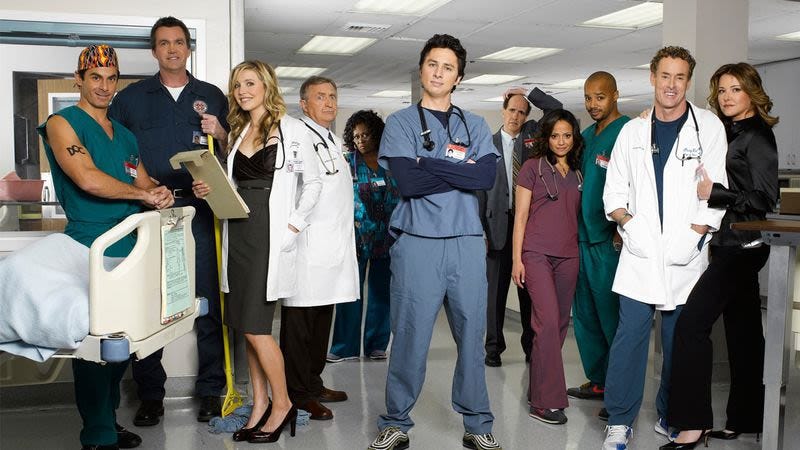
Fans of the beloved medical comedy series Scrubs were recently treated to a thrilling surprise when John C. McGinley, who portrayed the iconic Dr. Perry Cox, dropped a photo on Twitter hinting at a potential reunion project. The image, showing McGinley alongside his former co-stars, sparked a wave of excitement and speculation among fans who have been longing for more adventures with the beloved Sacred Heart Hospital staff.
While details about the reunion project are still scarce, the mere possibility of seeing the gang back together again has sent waves of nostalgia through fans who fondly remember the show’s original run from 2001 to 2010. Scrubs was not just a sitcom; it was a heartfelt exploration of friendship, love, and the chaotic world of medicine, all wrapped up in a quirky and often hilarious package.
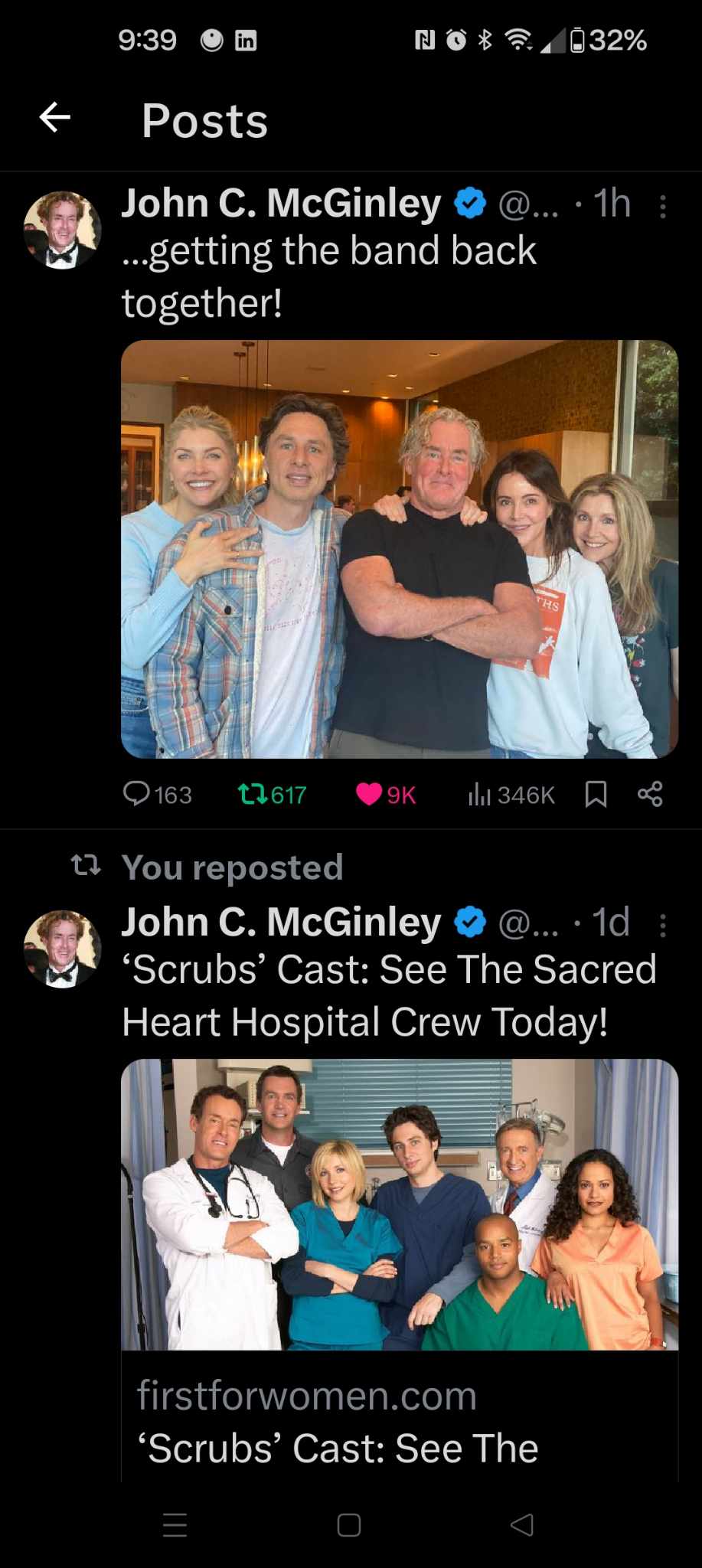
At the heart of the show was the bromance between JD (played by Zach Braff) and Turk (played by Donald Faison), whose antics and deep bond served as the emotional anchor for the series. Their dynamic, along with the sage wisdom (and relentless sarcasm) of Dr. Cox, provided viewers with memorable moments that have stood the test of time.
As we eagerly await more news about the Scrubs reunion project, one thing is for sure: it’s time to dust off those old DVDs, rewatch our favorite episodes, and get ready to welcome back our favorite gang of doctors, nurses, and janitors for what promises to be a memorable reunion.
But Scrubs was more than just its main characters. The supporting cast, including the eccentric Janitor (played by Neil Flynn), the neurotic Elliot (played by Sarah Chalke), and the wise-cracking nurse Carla (played by Judy Reyes), each brought their own unique flavor to the show, creating a rich tapestry of characters that fans grew to love.
While the photo shared by McGinley has fueled speculation about what the reunion project might entail, whether it’s a one-off special, a new season, or something else entirely, one thing is certain: fans are eagerly awaiting any opportunity to dive back into the world of Sacred Heart Hospital.
In an age where reboots and revivals are commonplace, Scrubs stands out as a series that has the potential to recapture the magic that made it a fan favorite in the first place. With its blend of humor, heart, and unforgettable characters, a reunion project has the opportunity to not only satisfy longtime fans but also introduce a new generation to the joys of life at Sacred Heart.
-

 Interviews1 day ago
Interviews1 day agoInterview With Heroes & Villains Creative Director Doug Johnson
-

 Streaming1 day ago
Streaming1 day agoApple TV+ announces season two for delightful kids and family series “Camp Snoopy
-

 Events1 day ago
Events1 day agoThat’s My E Coverage Of The Adult Swim’s Pirate Parrrty
-
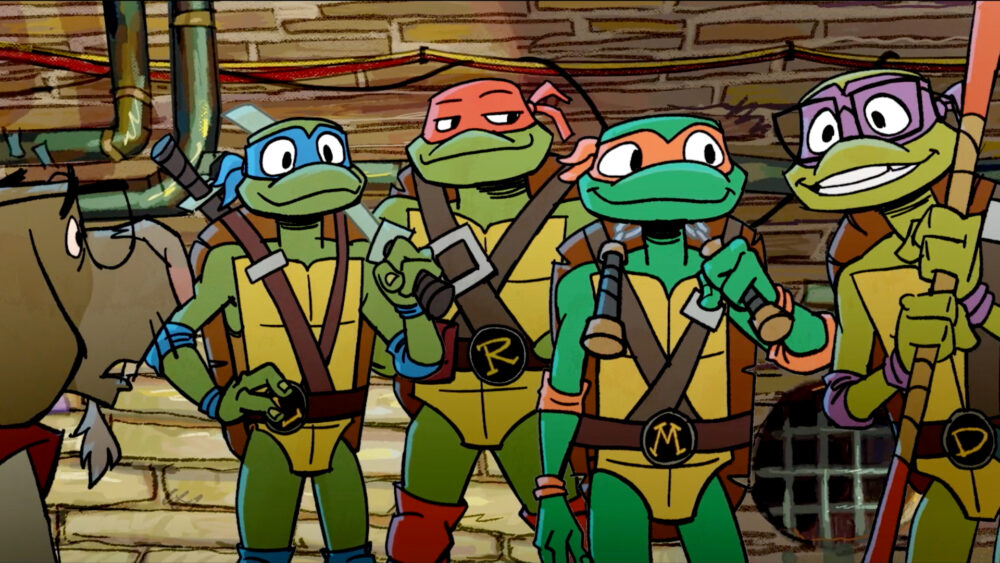
 Events9 hours ago
Events9 hours agoParamount+ Reveals Official Main Title Sequence for the Upcoming Series TALES OF THE TEENAGE MUTANT NINJA TURTLES
-
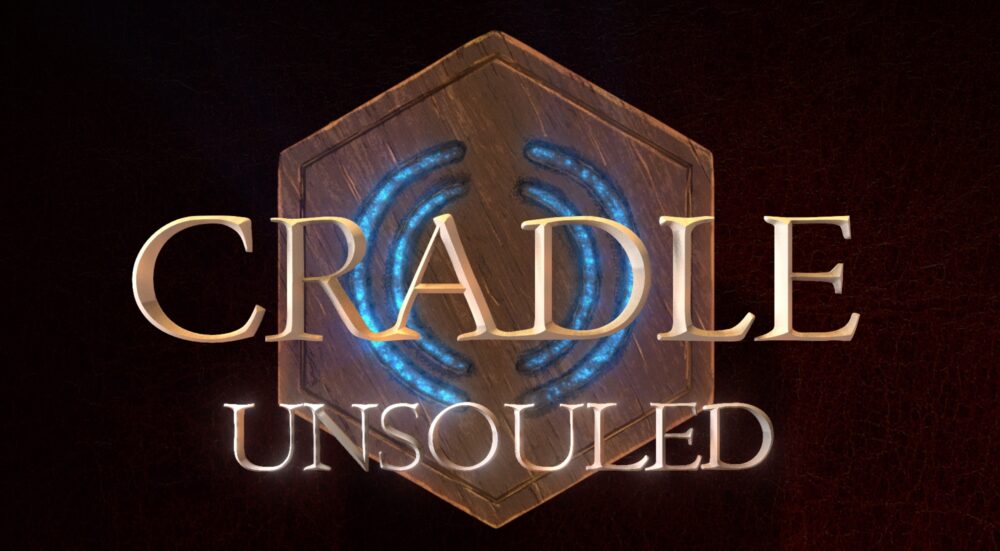
 Interviews13 hours ago
Interviews13 hours agoComic-Con 2024: Will Wight’s Cradle
-

 Events12 hours ago
Events12 hours agoDISNEY+ CASTS DANIEL DIEMER AS FAN-FAVORITE ‘TYSON’IN SEASON TWO OF “PERCY JACKSON AND THE OLYMPIANS”
-
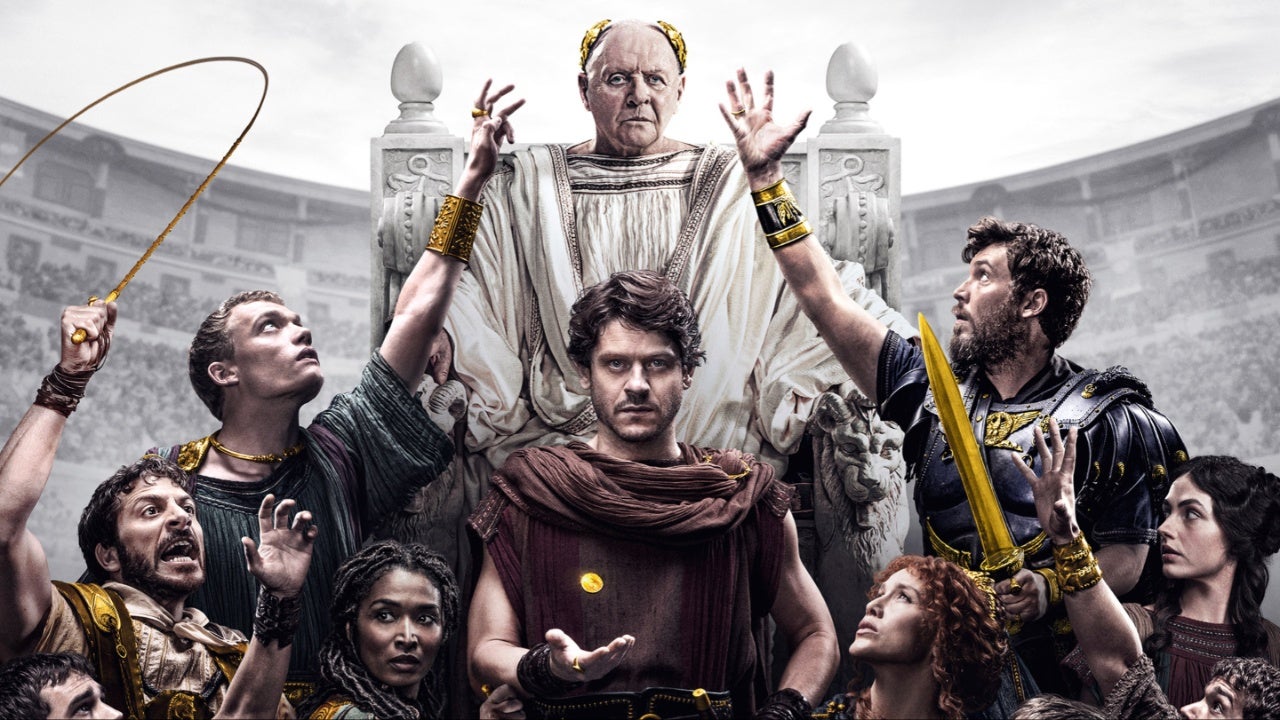
 Events12 hours ago
Events12 hours agoComic-Con 2024: Those About to Die Activation






